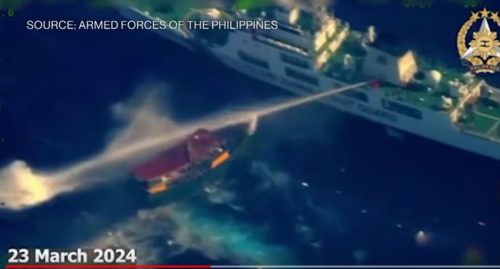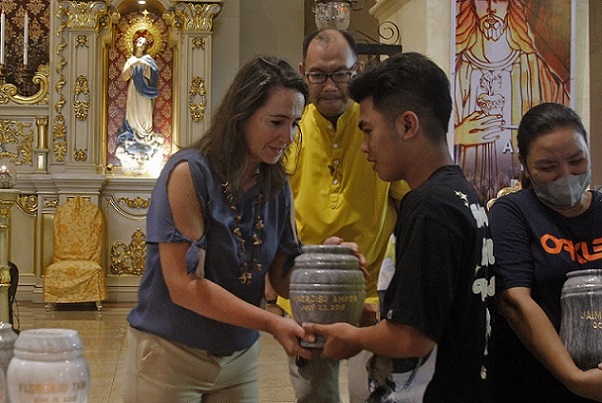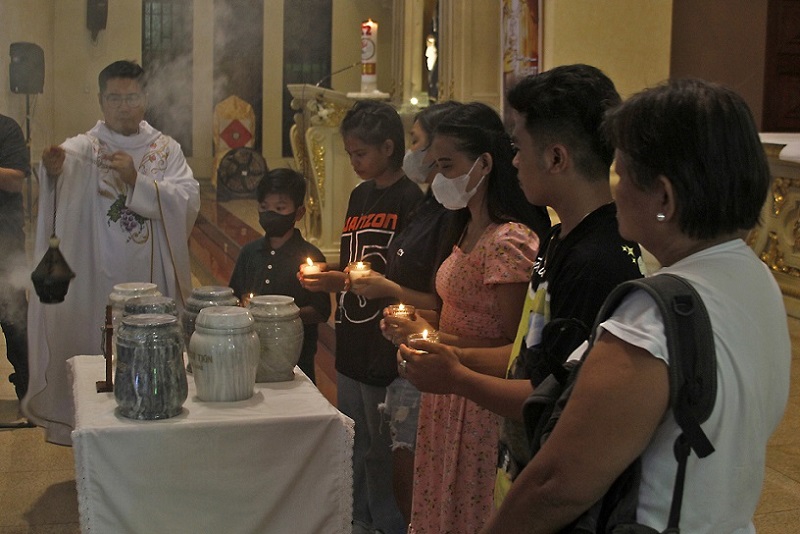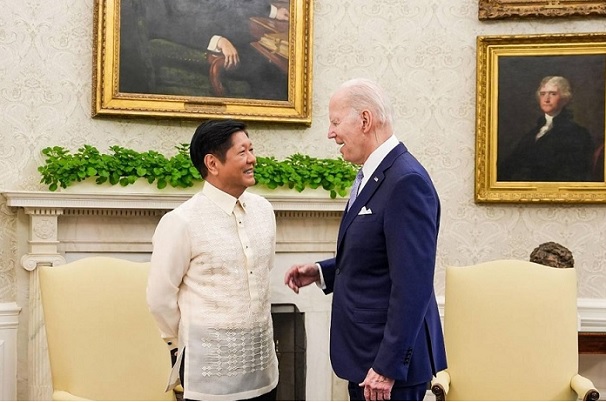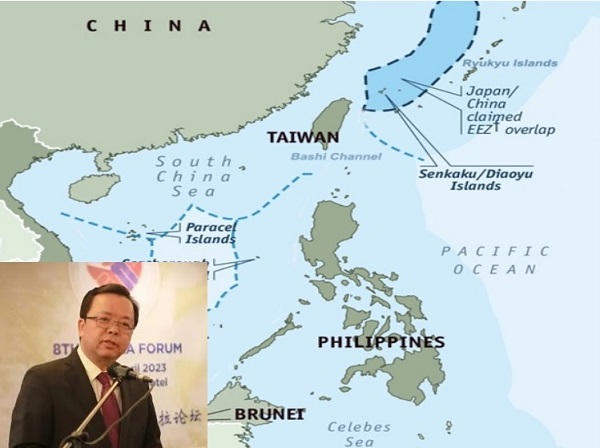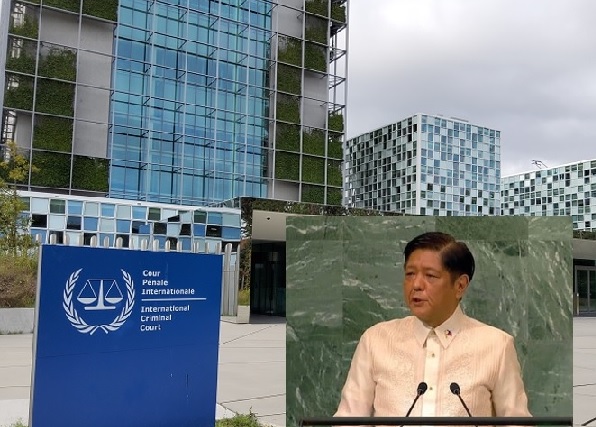When former president Rodrigo Duterte agreed with Chinese President Xi Jin Ping to not repair the BRP Sierra Madre, he was, in fact, abandoning the Marines valiantly manning the rusting ship, which has become a heroic symbol of the Philippine’s resistance against the creeping invasion by China.
In an interview on ABS-CBN after another water-cannoning of the rotation and reprovisioning (RORE) vessel bound for Ayungin Shoal on March 23, Harry Roque, former spokesperson of Duterte, disclosed that the former president and Xi had “a gentleman’s agreement.”
“Ito’y oral [agreement] sa panahon ni [dating] presidente Duterte na ang parehong panig, ang Tsina’t Pilipinas, ay rerespetuhin ang status quo; ibig sabihin, kung ano ‘yung naroroon na, walang dagdag, walang bawas,” Roque said.
(It was an oral agreement during the time of [former] president Duterte in which both sides, China and the Philippines, will respect the status quo; which means, what is there, nothing will be added, nothing will be subtracted.)
Roque said he learned about the agreement in 2018, when Duterte called China’s ambassador to Malacañang after a Chinese ship sprayed water cannon on a RORE vessel bound for Ayungin Shoal. The envoy claimed that “papayagan nilang dalhan ng tubig at pagkain, hindi ang pagpapadala ng materyales for repair ng BRP Sierra Madre.”
(They will agree to the bringing of water and food, but not materials for the repair of BRP Sierra Madre.)
This is underscored in the statements of the Chinese Foreign Ministry spokespersons to justify the Chinese blocking of RORE vessels: “This Philippine resupply mission is not to send necessities, but to bring construction materials to the military vessel illegally grounded at Ren’ai Jiao for its repair and reinforcement in an attempt to build a permanent outpost on China’s uninhabited reef so as to permanently and illegally occupy Ren’ai Jiao.“
Why is China violently opposing the repair of BRP Sierra Madre?
Ayungin Shoal (international name is Second Thomas Shoal; Chinese name, Rén’ài Jiāo ) is a low- tide elevation (meaning, it’s underwater during high tide) in the Spratly Islands in the South China Sea. It is 105 nautical miles from Palawan and is part of the country’s exclusive economic zone and continental shelf. China claims it belongs to Nansha Qundao or Spratlys, which is part of its territory based on its discredited nine-dash line map.
Ayungin Shoal is doubly important to China because it is 21 nautical miles from Mischief Reef (Philippine name, Panganiban Reef; Chinese name, Meiji Jiao), which China occupied in 1995 during the presidency of the late Fidel Ramos and has since developed a military base there complete with an airport.
In retaliation, the Philippine Navy, under the Estrada administration, intentionally grounded he BRP Sierra Madre in Ayungin Shoal.
Built in 1944, the 100-meter long BRP Sierra Madre was originally a World War II vintage US Landing Ship Tank (LSTs). It saw action during the Vietnam War as USS Harnett County. In 1976, it was transferred to the Philippine Navy.
Despite its dilapidated state, BRP Sierra Madre in Ayungin Shoal is a constant source of annoyance to China. Countless times, Chinese officials have told the Philippines to remove it. They would have done so themselves if not for potential politically serious consequences.
BRP Sierra Madre is Philippine territory
BRP Sierra Madre is “a commissioned Philippine naval vessel.” A country’s naval ship is considered part of its territory.
If China touches or steps on any part of BRP Sierra Madre, it would be an act of war. It has to reckon with the 1951 PH-U.S. Mutual Defense Treaty which states in part, “Each party recognizes that an armed attack in the Pacific area on either of the parties would be dangerous to its own peace and safety and declares that it would act to meet the common dangers in accordance with its constitutional processes. “
The treaty also says, “… an armed attack on either of the parties is deemed to include an armed attack on the metropolitan territory of either of the parties, or on the island territories under its jurisdiction in the Pacific Ocean, its armed forces, public vessels or aircraft in the Pacific.”
Secretary of State Antony Blinken, during a visit to Manila on March 20, reiterated the current U.S. assurance that its “iron-clad” commitment under the MDT “extends to armed attacks on the Filipino armed forces, public vessels, aircraft – including those of its coast guard – anywhere in the South China Sea.”
Nobody wants an armed clash between China and the United States in the South China Sea. That would be a catastrophe. Not even China, despite its strong warning that “if the Philippines does not change course, China will continue to take resolute steps to safeguard its territorial sovereignty and maritime rights and interests.”
Hoping and waiting for the worst for BRP Sierra Madre
What China wants is for BRP Sierra Madre to decay fast and become uninhabitable. The eight Marines stationed there would be forced to abandon it. That would pave the way for China to occupy Ayungin Shoal, which is just 105 nautical miles west of Palawan.
Duterte’s agreement with China to not bring construction materials for the repair of BRP Sierra Madre supports China’s desired scenario. That was surrender.
In effect, Duterte abandoned the patriotic and courageous Marines to the mercy of China. That was abandonment of his sworn duty to protect and serve the people. It’s treason.
This column also appeared in Malaya Business Insight, VERA Files
